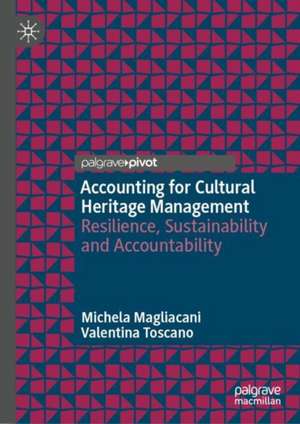Accounting for Cultural Heritage Management: Resilience, Sustainability and Accountability
Autor Michela Magliacani, Valentina Toscanoen Limba Engleză Hardback – 8 sep 2023
This book aims at understanding the role of cultural heritage in the economy, in society and in facing the new challenges deriving from the enactment of the UN Sustainable Development agenda, as well as the pandemic emergency from COVID-19. It adopts a managerial accounting studies approach to provide answers that can be applied in any organizationalcontext. The results achieved from the field research are critically discussed under the theoretical frameworks referring to the theory of value and its creation. From the findings and their discussion, a conceptual model based on empiricism is proposed for managing cultural heritage of communities under sustainable perspective, even in times of crisis. It will be essential reading for academics and students of cultural heritage management, sustainability and crisis management in organisations.
Preț: 321.54 lei
Nou
Puncte Express: 482
Preț estimativ în valută:
61.53€ • 64.41$ • 50.91£
61.53€ • 64.41$ • 50.91£
Carte tipărită la comandă
Livrare economică 05-19 aprilie
Preluare comenzi: 021 569.72.76
Specificații
ISBN-13: 9783031382567
ISBN-10: 3031382560
Pagini: 197
Ilustrații: XX, 197 p. 54 illus.
Dimensiuni: 148 x 210 mm
Greutate: 0.41 kg
Ediția:1st ed. 2023
Editura: Springer International Publishing
Colecția Palgrave Macmillan
Locul publicării:Cham, Switzerland
ISBN-10: 3031382560
Pagini: 197
Ilustrații: XX, 197 p. 54 illus.
Dimensiuni: 148 x 210 mm
Greutate: 0.41 kg
Ediția:1st ed. 2023
Editura: Springer International Publishing
Colecția Palgrave Macmillan
Locul publicării:Cham, Switzerland
Cuprins
1 Introduction: Research Aims, Methodology, and Design.- References.- 2 Cultural Heritage Under a Managerial-Accounting Perspective.-2.1 Introduction.- 2.2 The Managerial Features of Cultural Organizations.-2.2.1 Community of People, Organization, Decisionmaking/ Responsibility.-2.2.2 Legal Form.- 2.2.3 Mission and Objectives.-2.2.4 Assets.-2.2.5 The Creation Processes.- 2.3 Value Cocreation.-2.4 The Multidimensional Created Value: Measurement and Reporting.-2.4.1 Economic Value: How to Measure and Report?.- 2.4.2 The Sociocultural Value: How toMeasure and to Report?.- 2.4.3 The Case of the Civic Museums of Pavia (Lombardy).-2.5 The Cultural and Creative Production Ecosystem.- 2.5.1 The Museum of Electrical Technology of Pavia (Lombardy).- 2.6 Final Remarks.-References.- 3 Using Accounting for Managing Cultural Heritage.-3.1 Introduction.-3.2 Strategic Thinking and Planning.- 3.3 The Balanced Scorecard for Cultural Organizations.- 3.4 The Roadmap of Cultural Value Creation.-3.4.1 The Case of the Cultural Rural Network Project.- 3.5 The Budgeting and Cost Accounting for Cultural Organizations.- 3.5.1 Cultural Budgeting.-3.5.2 “Cultural” Cost Accounting.- 3.6 Final Remarks.-References.-4 Cultural Heritage and Sustainable Development: How Does Accounting Matter?.- 4.1 Introduction.- 4.2 Culture for the Agenda 2030.-4.3 The European and Italian Guidelines.- 4.4 The UNESCO Culture 2030 Indicators.-4.5 Accounting and Sustainability: Multiple Case Studies—The European and Italian Capital Cities of Culture.-4.5.1 Overview.-4.5.2 Methodology.- 4.5.3 Results.-4.5.4 Discussion.-4.6 Final Remarks.- References.-5 The Resilience in Cultural Heritage Management: Which Role for Accounting?.-5.1 Introduction.- 5.2 The Notion of Resilience in Management Studies.-5.3 Digital Technologies for Resilience.-5.3.1 The Lessons from the Italian Universities’ Museums During the COVID-19 Pandemic.-5.3.2 The Experience of the Italian Association of Corporate Archives and Museums.- 5.4Final Remarks.- References.-6 Resilience, Sustainability, and Accountability: Conceptual Propositions.- 6.1 Introduction.- 6.2 Cultural Heritage and Resilience.-6.3 Cultural Heritage and Sustainability.- 6.4 Cultural Heritage and Accountability.-6.5 Final Remarks: A Conceptual Model.-References.- 7 Conclusions.-References.
Notă biografică
Michela Magliacani is Associate Professor of Business Administration at the Department of Economics and Management of the University of Pavia, Italy. Her research field is focused on cultural heritage management, accounting history and public services accounting and management. She has published widely in books and journals.
Valentina Toscano is a Ph.D. student in Business for Society at the Department of Business and Law of the University of Milano-Bicocca, Italy. Her research interests concern accounting, cultural heritage management, sustainability, and resilience.
Valentina Toscano is a Ph.D. student in Business for Society at the Department of Business and Law of the University of Milano-Bicocca, Italy. Her research interests concern accounting, cultural heritage management, sustainability, and resilience.
Textul de pe ultima copertă
The transformative role of culture, its ability to create value for the benefit of current and future generations, is widely recognized by academics of many disciplines, professionals and policymakers. Notwithstanding, how culture can be a driving force for economic growth, a source of welfare and tools for social inclusion, still deserves to be investigated at various levels, starting with local communities. This book attempts to explain the relevance of accounting knowledge for managing cultural heritage by sustainable, resilient, accountable organizations, regardless of their public or private institutional form.
This book aims at understanding the role of cultural heritage in the economy, in society and in facing the new challenges deriving from the enactment of the UN Sustainable Development agenda, as well as the pandemic emergency from COVID-19. It adopts a managerial accounting studies approach to provide answers that can be applied in any organizational context. The results achieved from the field research are critically discussed under the theoretical frameworks referring to the theory of value and its creation. From the findings and their discussion, a conceptual model based on empiricism is proposed for managing cultural heritage of communities under sustainable perspective, even in times of crisis. It will be essential reading for academics and students of cultural heritage management, sustainability and crisis management in organisations.
Michela Magliacani is Associate Professor of Business Administration at the Department of Economics and Management of the University of Pavia, Italy. Her research field is focused on cultural heritage management, accounting history and public services accounting and management. She has published widely in books and journals.
Valentina Toscano is a Ph.D. student in Business for Society at the Department of Business and Law ofthe University of Milano-Bicocca, Italy. Her research interests concern accounting, cultural heritage management, sustainability, and resilience.
Caracteristici
Understands how cultural organizations can survive despite the austerity in which they operate Includes case studies, analyses, interviews and ethnographical observations of resilient sustainable organisations Provides technical knowledge of how to apply accounting and accountability tools to cultural organizations
